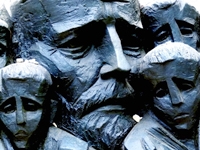
Olivier Melnick tells of non-Jews who saved his mother in WWII France
After the end of World War II, Gen. Dwight D. Eisenhower visited a concentration camp, and what he saw there was so unbearable it prompted him to document it as thoroughly as he could. He wrote in a letter to George Marshall:
“But the most interesting – although horrible – sight that I encountered during the trip was a visit to a German internment camp near Gotha. The things I saw beggar description. While I was touring the camp I encountered three men who had been inmates and by one ruse or another had made their escape. I interviewed them through an interpreter. The visual evidence and the verbal testimony of starvation, cruelty, and bestiality were so overpowering as to leave me a bit sick. In one room, where [there] were piled up 20 or 30 naked men, killed by starvation, George Patton would not even enter. He said he would get sick if he did so. I made the visit deliberately, in order to be in position to give firsthand evidence of these things if ever, in the future, there develops a tendency to charge these allegations merely to ‘propaganda.’” (Letter, DDE to George C. Marshall, 4/15/45 [“The Papers of Dwight David Eisenhower, The War Years IV,” doc #2418])
Gen. Eisenhower wanted to be a firsthand witness of the horrors of the Holocaust to help preserve its memory, knowing full well that human nature is such that there could be a day when people seriously claim that the tragedy never happened. It has only been about 70 years, and I am afraid Eisenhower was right.
I grew up in France in the ’60s in a Jewish family that had known the war, the Holocaust and had even taken part in the French Resistance. For me, the Holocaust was never to become a “non-event,” “a myth” or, like extreme-right French leader Jean-Marie Le Pen recently said: “A detail of Second World War history.”
I am sickened by the twisted propaganda from various countries, keeping a straight face as they deny the Holocaust – albeit in the same breath in some cases threatening Israel’s existence with another Holocaust! “Another one” based on what, since the first one apparently never happened? Holocaust denial is rampant in Iran and with Hamas, Hezbollah, and the Muslim Brotherhood. Even in the “enlightened Western world” there have been holocaust deniers like LePen (France), David Irving (Great-Britain), Bobby Fisher (the United States, born of a Jewish mother) and many more.
We live at a time when the few remaining survivors of the Holocaust, now in their late 80s and 90s, are quickly disappearing. At the same time, many of those who helped the Jews during the ’30s and the ’40s are also dying or already dead. The rapid diminishing of eyewitnesses is coupled with a postmodern lack of interest in history in general and negative history in particular. The pathetic result is that younger generations are growing increasingly unaware of AND uninterested in the Holocaust.
In contrast to the hatred of the Jewish people demonstrated by the Nazis and the Vichy government, many people chose to help the Jews. They are part of a select group of non-Jews worldwide known as the “Righteous Gentiles” or “Righteous Among the Nations.” Today many of them are recognized as heroes against all odds.
In 1963 Yad Vashem (Israel’s Holocaust Museum) started to honor the Gentiles who helped Jews during World War II. In the 70 years that have passed, about 25,000 individuals worldwide have received the honor from the state of Israel; less than 3,700 of these are from France. All were honored for helping Jews during a little more than a decade of hell.
The Righteous Among the Nations are as important to remember as the survivors themselves because without them there wouldn’t be any survivors. As a matter of fact, if it weren’t for the heroism of a couple from the south of France, I wouldn’t be alive today.
Pierre and Ida Darricau were simple peasants from the small village of Savignacq at the base of the Pyrénées Mountains, near Pau. In the summer of 1942, they took in my 15-year-old mother, Evelyn Weinzveig, and her two cousins. My family members were sheltered on this farm, away from the Nazis and any other danger, until the end of the war. To the Darricaus, like to all the other “Righteous Gentiles,” it was the most natural thing to do. To them:
- My mother and her cousins were simply human beings in need.
- The Nazis were monsters that had to be stopped at any price.
- The sacrifice of three more mouths to feed was overcome by the value of human life.
Their story along with the miracle of my mother’s safe two years on the farm was documented recently on the French television show “Supplément d’Enquête.” I just finished editing the segment and adding subtitles so that I could share this incredible story with my English-speaking friends. You can view it here, and I hope that you will share it with the world as well.
It doesn’t take courage to be a Righteous Among the Nations; it simply takes human decency. And in our day and age, I am afraid “common decency” has become a rare quality – especially when it comes to helping Israel and the Jewish people. Yet I can say with assurance that I know plenty of 21st century “Righteous Gentiles” who would give their lives for my family and me.
I pray at least some lessons were learned from the ashes of the Holocaust. Regardless, when (not if) my people become hunted again, it would behoove us to model our deeds after the “Righteous Gentiles” of yesteryear. It is vital for the Jews that we do!
Then God said: “Let us make man in Our image, according to Our likeness (Genesis 1:26a)”
Olivier Melnick
www.newantisemitism.com